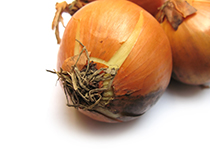Onions snitch about their ails
Aarhus University carries out research on promoting resource efficiency in all parts of the food chain. This includes a large project in which researchers and the industry are collaborating to prevent discarding several tons of onions annually. The aim is to make onions tell about their diseases before it is too late.

Evaluating onion quality can be difficult, even for Danish onion growers. Today, the quality at harvest is assessed according to whether producers expect their onions to be stored for a long period or if the onions are to be shipped to consumers shortly after harvest in order not to be wasted.
Unfortunately, not all quality issues are visible to the naked eye at harvest and several tons of onions may be discarded each year because they deteriorate during storage.
At Aarhus University scientists carry out research in resource efficiency at many levels and test various methods to prevent food losses and waste during storage. An example of this is a major project aiming at reducing waste of onions.
- High storage wastes mean that production costs are divided on less salable produce and that primary producers will miss out on income as they have already paid growing, harvesting and storage costs. Onions are inexpensive products and it is therefore important to sell as much as possible of the production. A little less waste can tip the balance towards a sustainable business, says Associate Professor Merete Edelenbos from the Department of Food Science at Aarhus University.
All onions count
The project is an innovation consortium focusing on the entire value chain from the field until the product reaches retail. The long list of project participants ranges from primary producers, technology companies and suppliers to interest groups, sales organizations and knowledge institutions.
Merete Edelenbos is in charge of the project’s research. Together with her colleagues she is developing methods that will make it possible to evaluate product quality during storage. As their specific starting point the scientists use the onions’ release of volatile organic compounds. The scientists gather the volatile compounds from onion storage rooms and bring back the samples for laboratory analysis. They also bring back onions to examine the quality.
- Onions are stored in two-ton boxes. It is therefore important that producers stock onions that are fit for storage. However, it is very difficult to evaluate storage shelf life at harvest time. We therefore aim to find ‘snitches’ that can help us measure quality changes before they become visible to the naked eye. If we can get onions to tell us about their shelf life ability during storage, we might be able to avoid situations in which the producer has to discard a significant part of the production, says Merete Edelenbos and further explains that a major goal is to use research results to develop actual tools.
For the benefit of producers
The private company Axel Månsson A/S, located in Brande, is one of Denmark’s major vegetable producers and one of the industrial project partners. The company is very pleased with the scientist focus on this particular subject.
- The food waste problem is as topical as ever before. For raw material producers like ourselves it is particularly important to focus on the production stage before the products reach retail. It is important to achieve the highest possible product utilization to achieve optimum competitiveness, says CEO Axel Månsson, who hopes that the project results will cause a ripple effect:
- We hope that our contribution may affect the consortium in such a way that the results benefit the producers.
Further information
The project ”Strategies and technologies to reduce food waste in potatoes and vegetables” is managed by the Danish Technological Institute – AgroTech and has a total budget of 37.3m DKK, of which 14.6m DKK is funded by the Danish Agency for Science, Technology and Innovation under the Ministry of Higher Education and Science. The participating companies and research institutions provide the remaining funding.
Kontakt
Associate professor Merete Edelenbos
Department of Food, Aarhus University
Telephone: +45 87158334
Mobile: 29450133
Mail: merete.edelenbos@food.au.dk
